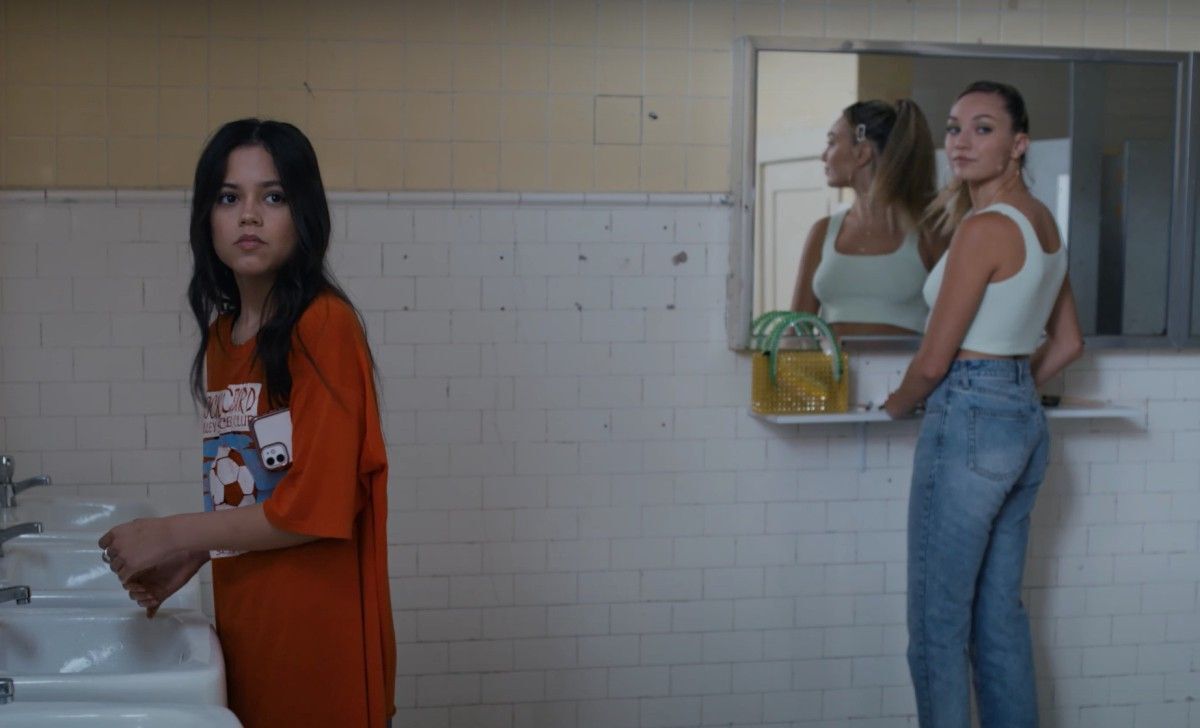School shooting movies tend focus on the buildup to the event itself, sensationalize/dramatize the shooting cruelly for viewers, or focus on the parents of the shooter/victims. The Fallout puts the camera where it belongs most: on the students in that school, and what happens to them after the harrowing event. Thought I hope no more school shootings ever happen again, The Fallout exists to help emotionally unprepared teenagers cope with the post traumatic stress disorder they might be going through, and some ways you should or shouldn’t consider to help them understand their feelings to move forward in their lives.
In the first 10 minutes or so, we see Vada Cavell (Jenna Ortega) is a pretty normal teenager. She’s got loving parents (Julie Bowen and John Ortiz), a hyper-energetic but adoring younger sister Amelia (Lumi Pollack), and a bff Nick (Will Ropp). The life Vada was leading is immediately gone the minute those shots are fired and she hides in a bathroom stall with classmates Mia (Maddie Ziegler) and Quinton (Niles Fitch). Vada then begins the arduous process of figuring out how to move on from “the event”, with her family and friends doing their best to help Vada with her trauma.
Megan Park’s screenplay pulls off the near impossible, through it’s incredible use of that age old writing addage: “show, don’t tell.” That first 10 minutes is crucial, as it gives the audience enough of an idea of what Vada’s life is like, and how joyful, funny, and charming she is. That juxtaposes despondently to Vada’s post school shooting persona: she’s a shell of herself, doing the teenage 1 word answer thing. Like good parents, her mom and dad empathize, and try to get her to talk without being pushy, but poor Amelia just acts the same as before the shooting, and can’t comprehend what her sister is going through. The meat of The Fallout is Vada slowly coming to terms with her new reality, and how to get to a new sense of normal and cope with the pain while her family and friends try to keep up. Mia and Quinton give Vada not only outlets for her feelings through their shared experiences, but give her ideas of how to cope, both good and bad; the movie mines not only emotional catharsis from this but also a few brief moments of humor, as Vada gives drugs and alcohol a try. Mom and dad also make Vada see a therapist (Shailene Woodley) to try to coax their daughter back from the abyss, which Vada initially meets with eyerolling condescension because of all the therapy terms. Park’s story shows how recovery from PTSD is a process, not a light switch: there are small gains, then setbacks, then maybe a big breakthrough, then more setbacks/a relapse, etc. However, it does also make a point to show that having outlets for your feelings helps this process the most, and if you’re a loved one, the best thing you can do is be there for that person, which helps even if they seems to be mad at you on the surface.
It’s Jenna Ortega’s world now. The former Disney kid is all grown up. As she becomes a Scream Queen over the next few months, it’s important to remember that she can do the heavy dramatic stuff too. Ortega’s incredible in The Fallout. There’s a spritely sing songy feel to Vada in those early scenes that Ortega pops up occasionally after “the event” to let you know that old Vada is in there, but is not the same person anymore. Ortega’s drug use acting flirts with the silly line but in general works because we get more shades of Vada figuring out who this new version of her is. Plus, Ortega nails the heavy emotional stuff: each emotional scene with different characters fits perfectly, is unique to the situation, but still wholly the character Ortega is playing, a testament to the range she’s developed in her young career.
Thoughts and prayers. There’s nothing we can do. The only way to stop a bad guy with a gun is a good guy with a gun. I need my freedom to protect my family. I don’t want the government coming in and taking my guns away from me. For any politician or person who’s said/thought these words to defend their freedom to carry guns after a school shooting, I beg you to watch The Fallout. Hopefully, then you will see the how far, wide, and long-lasting these traumatic real events have on kids during their formative years, all because of perceived, slippery slope threats that MAY but probably won’t occur. And, I hope The Fallout also encourages you to talk about those fears, which can only help you overcome them, and bring you closer to your friends and community.

